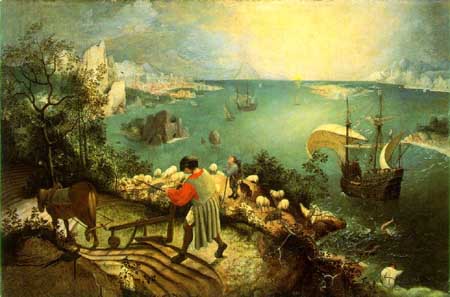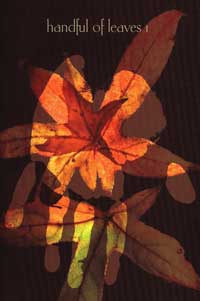by Paul Griffin
Because of the earthquake in Haiti, human suffering has been on my mind. Today, I wanted to share a W. H. Auden poem that deals with the theme of suffering. I haven’t written a Dharma Poetry blog post in a while, and while I do not consider Auden a particularly dharmic writer, I do feel that his poem “Musee des Beaux Arts” deftly touches on a key point about how we might begin working with the suffering of our fellow man: by paying attention to it.
“Musee des Beaux Arts” was inspired by Bruegel’s paintings, specifically his Icarus (below), which Auden would have seen when he visited Brussels in 1940.



About suffering they were never wrong,
Auden begins by crediting the Old Master painters with proper knowledge about suffering, specifically its “human position.” Auden believed that suffering had its correct “position” in the human experience, an experience which also included joy and fear and love, etc. In fact, I am not sure what exactly Auden would have thought of the first noble truth, that all life is suffering. He may have found such a formulation too simplistic, too reductive. Auden was more focused on the interconnected nature of the human experience, of which suffering was merely an aspect, but a central aspect indeed (perhaps the central aspect–I’ve heard it said that all of Auden’s poems show the traces of dried tears).
The Old Masters; how well, they understood
Its human position; how it takes place
While someone else is eating or opening a window or just
walking dully
along;
Notice how this line of poetry, too, walks dully along, dangling out beyond the others. Suffering takes place while the rest of life goes on, while the rest of us go on checking our email or eating dinner or watching TV. While the entire humdrum regularity of life continues here in the United States, those in Haiti suffer.
How, when the aged are reverently, passionately waiting
For the miraculous birth, there always must be
Children who did not specially want it to happen, skating
On a pond at the edge of the wood:
Even the birth of Christ is not an event upon which the whole of humanity can be focused. It is simply not within our power to focus our attention on any single event. There will always be kids skating on ponds or listening to their iPods.
They never forgot
“They” here are the master painters, who know that even in great tragedy, such as the Massacre of the Innocents in the New Testament, when King of Judea Herod the Great ordered the slaughter of thousands of infants in Bethlehem, life goes on, or in Auden’s terrific phrase, “dogs go on with their doggy life.” Auden is thinking of Bruegel’s painting The Massacre of the Innocents in the next few lines.
That even the dreadful martyrdom must run its course
Anyhow in a corner, some untidy spot
Where the dogs go on with their doggy life and the torturer’s
horse
Scratches its innocent behind on a tree.
Then, in the last eight lines, Auden focuses intently on Bruegel’s Icarus. How the ploughman and the shepard pay no mind to the tragedy of a boy falling out of the sky, which refers of course to the myth of Icarus–he flew too close to the sun, his wings melted, and he plummeted to the earth. Meanwhile, the “expensive delicate ship” and its captain sail calmly on because they have some place to be. Even nature herself cannot pay special attention to Icarus’s tragedy: “the sun shone / as it had to.”
In Breughel’s Icarus, for instance: how everything turns away
Quite leisurely from the disaster; the ploughman may
Have heard the splash, the forsaken cry,
But for him it was not an important failure; the sun shone
As it had to on the white legs disappearing into the green
Water; and the expensive delicate ship that must have seen
Something amazing, a boy falling out of the sky,
had somewhere to get to and sailed calmly on.
I don’t think Auden’s purpose here is didactic; in other words, I don’t hear him necessarily calling us to pay attention to Icarus’s fall. Rather, in this poem, Auden is merely describing the way things are. Great tragedies befall some of us, while the rest of us are busy. This is the way human suffering works; this is its “position” in human life.
That said, I felt that reading this poem and looking at this painting have helped me turn my attention once more to Haiti, to those suffering there, daily and terribly. Auden’s poem serves as a reminder to me to look when someone is drowning. To help, to donate. And at the very least, to pay attention, to hold these fellow suffering men and women in our minds and in our hearts, and in that way, to pray for them.

